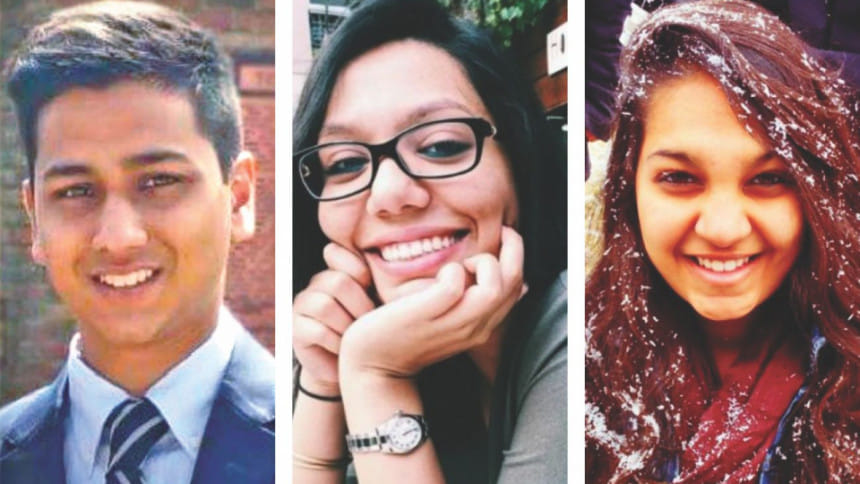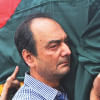Amidst the fear of terrorism, a reassurance

This time last year, we were in a collective state of shock. Pain and mourning would soon follow, but the later hours of July 1, 2016 initially held the millions of this country in a grip of dread and utter disbelief. For many of us, however, the bigger shock came the next day — this date on the calendar last year — as details of the incident started to become clear. Stories of what had transpired inside the Holey Artisan Bakery poured out; and faces of the terrorists plastered themselves on our social media, as did those of the hostages who had died. Faces that were all familiar.
Faraaz Ayaaz Hossain's story strikes a particularly strong chord within us. Faraaz, who was a young Bangladeshi Muslim brought up in a privileged, educated background, just like some of the attackers. Faraaz, who refused to leave the premises even when he could, and sacrificed his life in the name of friendship, unlike the attackers. The incident threw a harsh light on the no-longer-dormant presence of terrorism in our midst in Bangladesh, something that we had been blissfully unaware of until that point. But the most jarring revelation was that the people executing the attack had shared mostly the same age, education and socio-economic background as some of the hostages present at the restaurant. Now that we look back with a clearer but no less mournful perspective, we can appreciate the strong marks that Faraaz and his friends carved in the story of that night. Wielding kindness and their love for one another as unashamedly as the attackers had used their weapons, Faraaz, Tarishi and Abinta struck a stark contrast to the forces that lay siege on the Holey Artisan Bakery on July 1 last year. They proved that while some of the country's youth may be straying towards the path of destruction, there are others who will quite literally do anything for those that they love. This isn't to say that their loss was somehow more significant than the others present at the restaurant — the seven Japanese, nine Italians, two other Bangladeshis and one Indian who fell victim to the atrocities. If anything, it forces us to keep in mind what Faraaz had remembered even in such terrifying circumstances — that all human lives, and not just one's own, are precious.
The youth as a collective faction received much heat and scrutiny in the aftermath of the attack on Holey Artisan Bakery. English-medium students were blamed, more strongly than ever, of lacking sound religious awareness or emotional maturity. Students of specific private universities were permanently branded with the stigma of having potential ties with militant forces. Every social gathering entailed probing questions about whether a campus that many of us call home — a space containing some of our happiest memories — is truly a breeding ground for terrorism. And the prejudice surrounding students of madrassa and higher-level religious studies became more pronounced, more unabashed than ever before. Even as we reeled from the pain of the incident, we started worrying about other practical concerns — whether our background as a Bangladeshi Muslim youth from a certain educational institution would mar our chances of securing a job, an admission into a programme, or a visa to a foreign country.
This baggage will be an inescapable part of our reality for the years to come. But the memory of Faraaz's actions lightens the load. It helps to remember that our background isn't one that harboured murderers, but one that instilled a very young man like Faraaz with so much strength, maturity and love for humanity.
A brilliant student, an ace athlete, his act of bravery has been recognised worldwide. On July 15, 2016, a tree was dedicated to Faraaz at the Garden of Righteous Worldwide (GARIWO) at the Italian embassy in Tunisia. The Harmony Foundation in Mumbai honoured him posthumously with the 2016 Mother Teresa Memorial International Award for Social Justice in November 2016. And March 2017 saw the inauguration of the Hossain-Kabir room at the Oxford College of Emory University, where Faraaz and Abinta were students. While Muslims continue to face persecution on the international stage, Faraaz's legacy as a young man who stood up to terrorists and put friendship above everything, provides us with a beacon of hope. It makes us proud to represent a country and a faith that produced such a person; such a friendship.
Unlike the many people who have written heartfelt tributes for Faraaz, Tarishi and Abinta over the past one year, I wasn't acquainted with any of them. I am not haunted by memories with these three people who seemed to have been remarkable human beings even independent of their actions on the night of July 1. Instead, I am haunted by the uncomfortable truths that their fates pushed us to confront. Couldn't it have been any of us present at that restaurant that night? Would we have had the strength to choose friendship over safety? For all our declarations of love, would we sacrifice our life for a close one?
The truth is that we'll never know what it was like to have been a part of something like that, or gauge how we would have acted. To pretend otherwise is to belittle what the hostages at Holey Artisan faced that night. But even as I say this, I get flashes of a few faces that I would possibly have stayed back for in similar circumstances. Amid the constant fear and uncertainty that the events of July 1, 2016 have thrown us into, this reminder of the love we feel for those around us, made historic by the friendship of Faraaz, Abinta and Tarishi and immortalised by Faraaz's sacrifice, is reassuring.
The writer is a member of the Editorial department, The Daily Star.

 For all latest news, follow The Daily Star's Google News channel.
For all latest news, follow The Daily Star's Google News channel. 








Comments